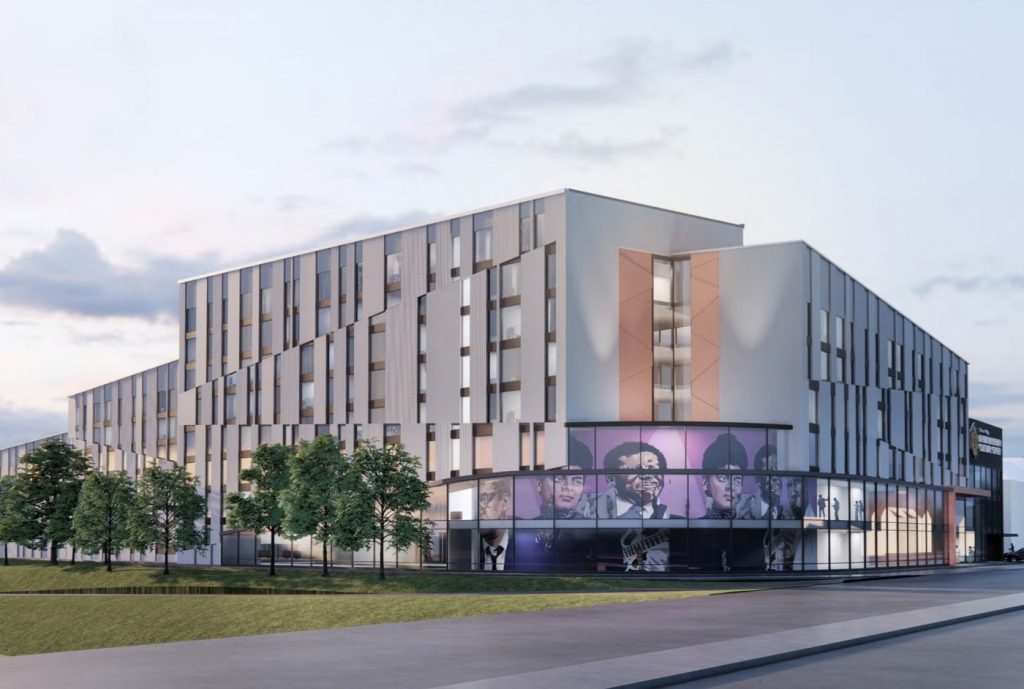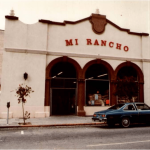SAN JOSE — A proposed San Jose hub for African American culture has added a high-profile nonprofit housing partner as a vision emerges for a vibrant complex near the city’s downtown.
EAH Housing has agreed to develop the residential component of the Silicon Valley African American Cultural Center, according to officials with the cultural hub.
Housing and open spaces next to Silicon Valley African American Cultural Center at 2001 The Alameda in San Jose, concept. (Moody Nolan, Y.A. studio)
Silicon Valley African American Cultural Center, open areas, museum, community spaces at 2001 The Alameda in San Jose, massing concept. Interstate 880 is also visible. (Moody Nolan, Y.A. studio)
“We’re very excited to have EAH Housing come on board,” said Joanna Farris, president and chief executive officer of the African American Cultural Center.
The housing will consist of approximately 150 units. An estimated 135 of these would be affordable and 12 to 15 units would be for-sale condominiums, according to Walter Wilson, project director of the African American Cultural Center.
Housing, open spaces and gathering areas and Silicon Valley African American Cultural Center at 2001 The Alameda in San Jose, concept. (Moody Nolan, Y.A. studio)
Silicon Valley African American Cultural Center and adjacent housing at 2001 The Alameda in San Jose, concept. (Moody Nolan, Y.A. studio)
Entry area of Silicon Valley African American Cultural Center at 2001 The Alameda in San Jose, concept. (Moody Nolan, Y.A. studio)
“It’s hugely significant to have EAH as our housing partner,” Wilson said. “EAH will build the housing, they will get the funding and then manage and direct the entire housing development.”
San Rafael-based EAH Housing is a nonprofit that has developed 107 properties with more than 8,700 residential units, and manages 235 properties with more than 13,000 units and over 25,000 residents.
“EAH has a great mission and history,” Wilson said. “They know what they are doing. Getting the housing in place really helps us proceed with the cultural center.”
Plus, the residential component can help play a role in efforts to ease the region’s housing woes.
“Lower- and moderate-income housing is what we need right now because housing is in very short supply in the Bay Area,” Farris said.
The African American Cultural Center has received big funding boosts on multiple fronts. In August 2023, state Sen. Dave Cortese announced $3 million in funds for the mixed-use development. In March 2024, U.S. Rep. Ro Khanna announced $4.1 million in federal funding.
The center, including financing from the two major government grants and other sources, has raised about $30 million. More is needed.
“We need to raise another $50 million and that campaign is underway right now,” Wilson said. “We have several other very sizeable grants lined up.”
In addition to the housing, varied activities related to African American culture will be part of the mixed-use development.
“The Center will serve as a hub for people celebrating and experiencing the ongoing contributions of African Americans, in education, music, theater, dance, science, athletics, business, and many other aspects of American life,” stated a post on the cultural center’s website.
Located at 2001 The Alameda near the street’s interchange with Interstate 880, the Silicon Valley African American Cultural Center is eyeing a groundbreaking for the project sometime in 2025. The center could begin operations in 2027. These timelines aren’t set in stone, however.
“The center will include meeting halls, banquet facilities, service organization offices, youth development facilities, a library, a museum gallery, social service providers, family, senior, and youth programs, child care, retail shops and a theatre/auditorium,” according to the center’s website.
Even though the construction start timeline might be fluid, officials with the African American Cultural Center sense they are getting close to the culmination of a decades-long venture to establish such a facility in San Jose.
“We have been patient, working towards this, and waiting for our dream to come true,” Farris said.


